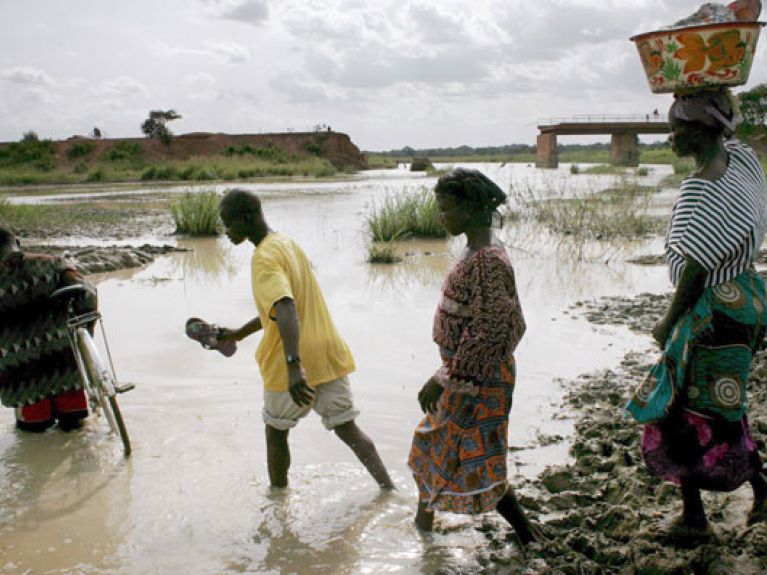Fighting the great flood
Climate change is already making itself felt in Beira, Mozambique: the groundwater level is rising, and many people’s livelihoods are under threat. Germany is committed to nature conservation and wants to reduce the consequences of climate change.

When Helena Alberto talks about her new home, she beams all over her face. She now has a shower of her own in which she has more than enough room to turn around, says the woman with the short black curls. To prove it, she turns around in a circle with her arms outstretched! She now even has a permanent job and can feed her seven children with her monthly salary of 4,000 meticais – the equivalent of about 87 US dollars. Just a few months ago, the 37-year-old was living in a makeshift corrugated-iron shack, selling sweets on the street to support her family. In the rainy season her district in the Mozambican town of Beira was often underwater for months. The children would fall sick, and they were all plagued by diarrhoea and malaria.
Helena Alberto and her family are benefiting from a project of the Germany’s Federal Ministry for Economic Cooperation and Development (BMZ); the long-term goal is to help the whole city. Germany’s government is spending 13 million euros on reviving the Rio Chiveve through its development bank KfW. After decades of pollution the river has completely dried up. Whenever there is heavy rain, it can no longer transport the water to the sea, which, combined with climate change, is increasingly becoming an existential danger for Beira and its 700,000 inhabitants. Beira is one of the African cities thought to be most threatened by climate change, because it is situated only just above the sea level, and in some places is even below it. If the sea rises in the wake of accelerated global warming, the city’s dams will no longer be able to protect it from flooding. The groundwater level is already rising, and in recent years the rainy season time has brought more and more heavy rainfall and cyclones.
Alberto and other families had fled poverty and moved to Mozambique’s second-largest city on the Indian Ocean, settling in the former river bed of the Rio Chiveve – which was quite unrecognisable as a river in the dry season. In the rainy season, however, masses of water from the hinterland return to their old routes and become a mortal threat. With the money from Germany the Rio Chiveve is now being thoroughly excavated so that the water can again flow freely down to the sea. This is why Helena Alberto and several other families have been resettled in homes within the city; like her, many of them found work on the construction site: a positive side effect of a project whose primary aim is to protect the city from the consequences of climate change. Some scientists predict that Beira will sink into the sea in 20 years. The city’s mayor, Daviz Simango, has no time for such predictions. But he also knows: “If the city’s drainage system doesn’t function properly, the first major flood will kill us all.” That’s why he believes the KfW Development Bank’s project is so important for the city.
The state bank handles the German Federal Government’s financial cooperation with poor countries and regions all over the world. The goals are many and varied: schools and roads are being built, health posts set up, public water supplies improved, renewable energy sources introduced and developed. The bank supports agriculture and food security, and provides small loans for small and medium-sized entrepreneurs so that they can set up their own businesses. In 2014 it pledged 7.4 billion euros for new projects. 1.2 billion euros went to 97 projects in sub-Saharan Africa – from Senegal to Cameroon and Madagascar. Depending on the financial strength of the respective partner country, the KfW provides either grants that need not be repaid, or loans at favourable terms. The KfW also tries to work together with local organisations. In Beira, for example, ADEL, a non-governmental organisation, has been entrusted with the afforestation of mangrove forests on the banks of the Rio Chiveve.
In one project regarded by KfW as especially successful, money was used to set up a cross-border corridor for wild elephants and other animals between Botswana, Namibia and Angola. Because of the political situation, the animals had been confined to small areas, impairing both the fauna and agriculture there. Farmers had turned to shooting the animals. But because they can now migrate over wider areas, both the animal populations and agriculture have recovered in the region. Many local people are now also benefiting from the fact that more tourists are travelling to the area.
A large proportion of the KfW’s development funds flows into education projects, because the local inhabitants often know little about ecological interrelations and lack the environmental awareness that is necessary for sustainable local development. This is also the case in Beira. In some parts of the city, the Indian Ocean is already washing houses away. This is due not so much to climate change as to the fact that these buildings were constructed much too close to the water, and important mangrove forests which once protected the coast were cut down. “Many people think: God put a tree here; if it’s important he will replace it with a new tree,” says ADEL staff member Amid Tayob. Yet until the people start cooperating fully, he adds, no lasting success can be achieved in the city. Tayob knows it will be a tough fight to protect Beira against climate change. The hope is that the money from Germany will at least make a contribution.

